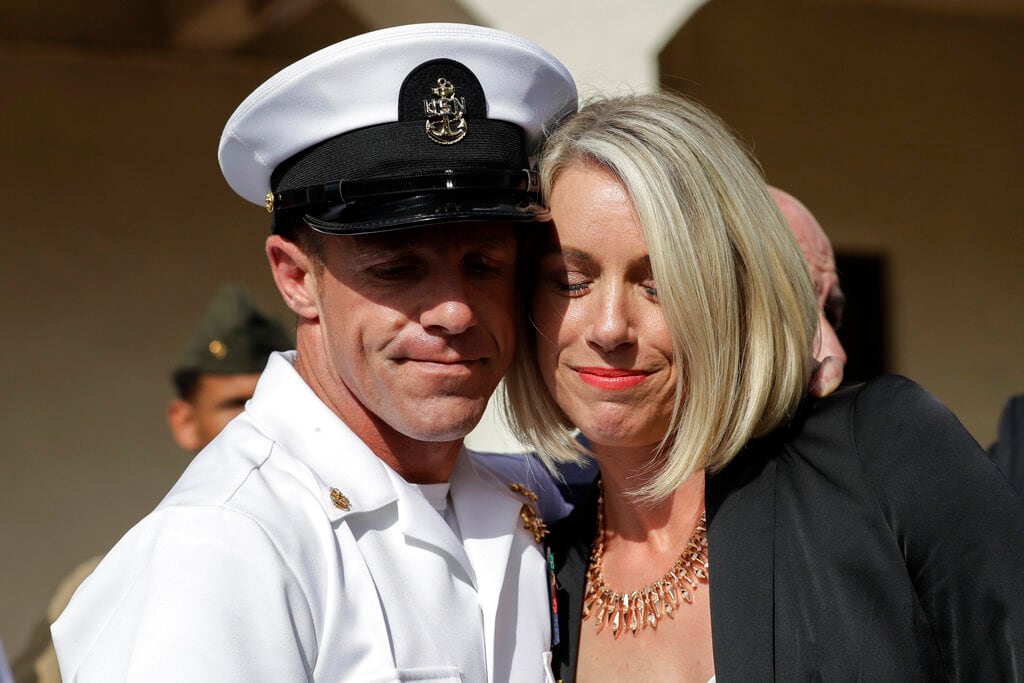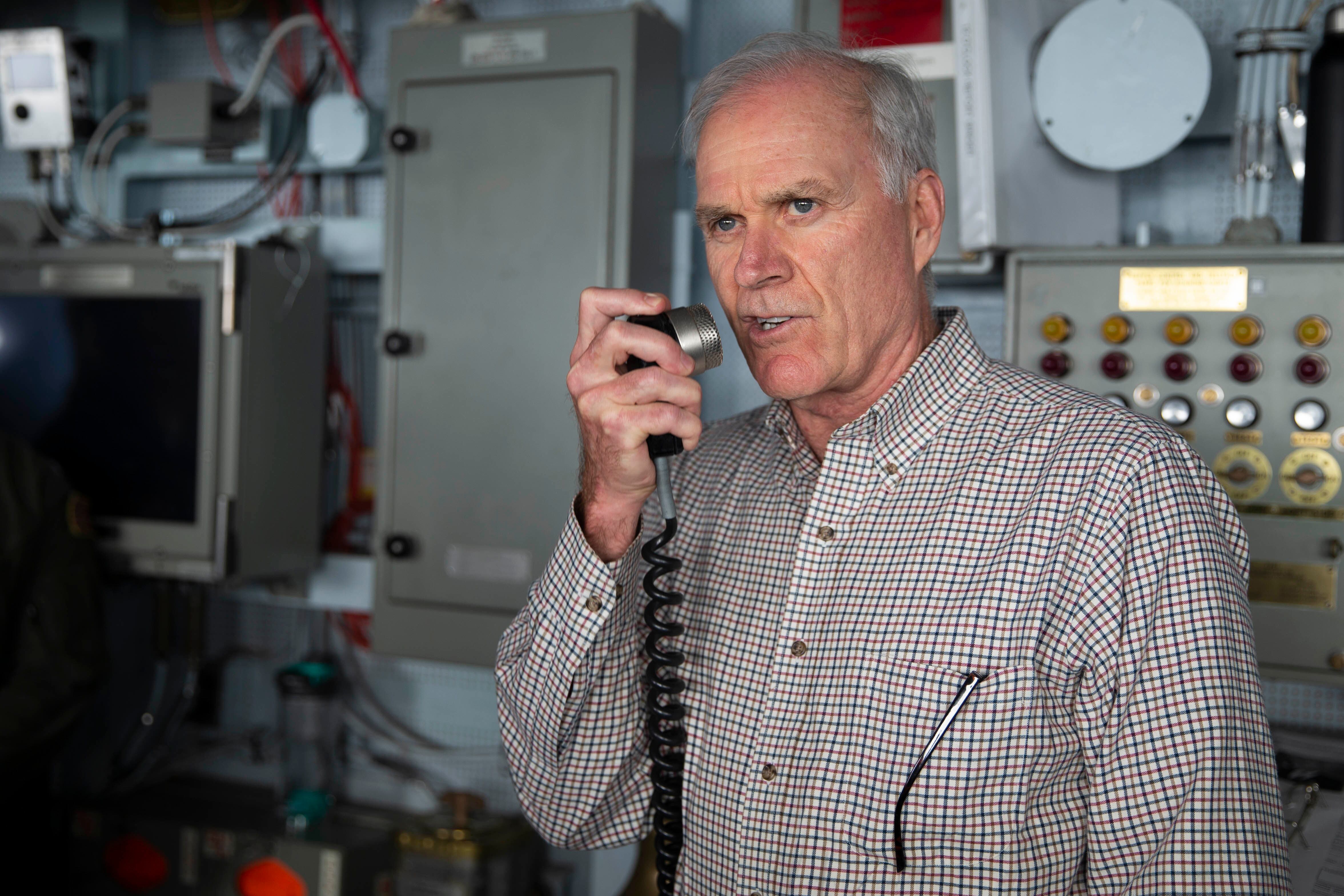After President Donald Trump announced Nov. 15 that he would restore the chief petty officer rank of a SEAL accused of war crimes earlier this year, senior Pentagon leadership agreed that they would convene a board of Navy chiefs to decide whether Chief Special Warfare Operator Eddie Gallagher would get to keep his coveted trident qualification pin that signifies his official status as a SEAL as he prepared for retirement later this month.
But unbeknownst to Defense Secretary Mark Esper and Chairman of the Joint Chiefs of Staff Gen. Mark Milley, Esper told reporters at the Pentagon on Monday, Navy Secretary Richard Spencer had gone behind their backs to broker a deal with the White House that would see Gallagher retire with his SEAL trident pin.
That was Spencer’s downfall, Esper said, noting that Spencer contradicted his public statements and his agreement with senior officials.
“Once we agree on a position, we stick to it and support it, both in private and public,” Esper said. “If you don’t like that position, then simply resign. Otherwise, implement it as if you would implement any order.”
Contrary to some media reports, Esper said, Spencer was not fired because he refused to follow a White House order to protect Gallagher’s trident. Spencer was fired, Esper said, because he agreed with senior defense officials to let the process play out, then circumnavigated his chain of command to appeal to the president’s preferred outcome.
Esper and Milley learned of the discussions as they left the White House on Friday, Esper said, when a senior White House official pulled them aside.
“This proposal was completely contrary to what we agreed to and contrary to Secretary Spencer’s public position,” Esper said.
Esper said he spoke to Trump on Saturday and Sunday, during which he got the president’s support to fire Spencer, and received the direct order to restore Gallagher’s trident.
Esper’s statements contradicted a resignation letter signed by Spencer and released late Sunday night.
“I cannot in good conscience obey an order that I believe violates the sacred oath I took in the presence of my family, my flag and my faith to support and defend the Constitution of the United States,” Spencer wrote, arguing that Trump’s position is contrary to good order and discipline.
The letter was hand-dated Nov. 24, bringing into question when it was actually written.

Esper told reporters that Spencer had confided in him that he would “likely, probably” resign if ordered to protect Gallagher’s SEAL qualification, though Spencer said Sunday that he had not “threatened” such action.
“This is my issue with trust and confidence,” Esper said. “I cannot reconcile the personal statements with the public statements and the written word.”
Further, Esper added, when he asked for Spencer’s resignation on Sunday, the SECNAV said he’d have it to him in 30 minutes, raising suspicions that Spencer had the letter prepared well in advance.
Esper would not confirm whether the Spencer letter made public Sunday night is the same one he received Sunday afternoon.
According to a pool report filed Monday, Trump was asked in the Oval Office about Spencer’s firing and the president said he and others had “been thinking about that for a long time, that didn’t just happen,” before adding “It’s about time.”
He also called Gallagher a “great fighter.”
RELATED

In the end, Gallgher will retire as a Navy SEAL.
“The case of Eddie Gallagher has dragged on for months and has distracted too many,” Esper said. “It must end.”
Gallagher will retain his Budweiser, without an administrative review, he added. Despite a strong belief in process, Esper said, his desire to put the saga in the past is stronger.
“As professional as they are, no matter what [the review board] would decide, it would be criticized from many sides and further drag this issue on, dividing the institution,” Esper said of the review board.
Esper confirmed that three more SEALs who were due to have their qualifications reviewed will go forward with their boards.
“I want the SEALs and the Navy to move beyond this now,” Esper said, with their internal review of their “professional standards, ethics and conduct. These two issues are related.”
But the attorneys for Lt. Jacob X. “Jake” Portier aren’t moving beyond it and have vowed to file another round of Pentagon Inspector General complaints against Rear Adm. Collin Green, the commander of Coronado, California-based Naval Special Warfare.
The officer in charge of Gallagher’s platoon in Iraq, Portier was facing charges that he covered up a crime that a military jury said never happened when former Chief of Naval Operations Adm. John Richardson stepped in to dismiss the case.
Although Portier sought to resign his commission in the wake of Richardson’s decision, he’s been involuntarily held in service so that he can undergo a Trident Review Board to determine if he can remain on active duty as a SEAL, something he obviously no longer wants to do.
“There are no reports that the Trident Review Boards were rigged,” said attorney Jeremiah J. Sullivan III. “Lt. Portier has no chance at justice in a rigged system. We will be filing complaints with the Secretary of Defense since Naval Special Warfare’s JAG refuses to respond to my emails.”
On Monday, Esper said he asked the Pentagon’s general counsel to review how the Defense Department trains service members on wartime ethics, as well as how it investigates and adjudicates misconduct.
RELATED

At the same time, Special Operations Command in the fall wrapped up its own review of its ethics and professionalism, one of several conducted in different parts of the community throughout the past year.
“This is an ongoing discussion and I have great confidence in him,” Esper said of SOCOM boss Army Gen. Richard Clarke, who initiated the review last summer.
Trump tweeted Sunday night that he intended to nominate the U.S. ambassador to Norway, retired Rear Adm. Kenneth Braithwaite, to replace Spencer, a recommendation by Esper.
In the meantime, Navy Undersecretary Thomas Modly will serve as the acting SECNAV.
“So, if folks want to criticize anyone, at this point, about reaching down into the administrative processes, then simply blame me,” Esper said. “I’m responsible at this point. It’s not where I prefer to be, but I’ll own it.”
Update: This story has been updated to reflect the president’s statement on the firing and a statement from the attorney of one of the officers going before a Trident Review Board.
Meghann Myers is the Pentagon bureau chief at Military Times. She covers operations, policy, personnel, leadership and other issues affecting service members.
Prine came to Navy Times after stints at the San Diego Union-Tribune and Pittsburgh Tribune-Review. He served in the Marine Corps and the Pennsylvania Army National Guard. His awards include the Joseph Galloway Award for Distinguished Reporting on the military, a first prize from Investigative Reporters & Editors and the Combat Infantryman Badge.




